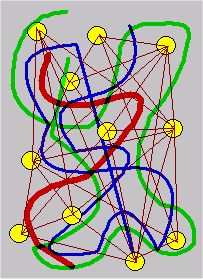30 Aug Eclecticism and Cognitive Modeling
 Cognitive Science
Cognitive Science
Hybrids in plants and automobiles are great. Perhaps in computers and apps as well. I have always thought of myself as deeply interested in the “cross-pollination of ideas.” This includes, when appropriate, snipping sequences and splicing to create genetically modified innovations. The posts in the Understanding Context blog span the knowledge and theories of these six academic disciplines often united under the umbrella of cognitive science:
 Neuroanatomy/Physiology
Neuroanatomy/Physiology- Linguistics
- Philosophy
- Anthropology
- Psychology/Learning Theory
- Computer Science/Artificial Intelligence
Although listed in the historical sequence of when each academic discipline was most likely established (see below), the order of each on the list is unimportant. What matters is its inclusion. Cognitive science is the sum of its parts. While some might argue that cognitive science with missing parts can still be filling, it is surely less satisfying.
| Understanding Context Cross-Reference |
|---|
| Click on these Links to other posts and glossary/bibliography references |
|
|
|
| Prior Post | Next Post |
| Specialized Areas of the Brain | Building a Cathedral of Knowledge |
| Definitions | References |
| empirical logic | Gardner 1985 Blackwell 2009 |
| epistemological | cognitive science references |
 What Came First?
What Came First?
Why, you might ask, is physiology first on the list? Quite simply, it is because brain surgery in its various forms has been popular since the invention of the club! Linguistics comes next because folks were talking long before logic was invented. To put the list in the context of academic history, consider the words of Ovid in his book Metamorphosis:
“Before land was, and sea, before air and sky,
arched over all, all nature, was all chaos…”
If it is indeed the case that chaos ruled before anything else knew order, then computer science could be the oldest of all disciplines, not the most recent. Like I said before, inclusion on the list has far more significance than chronological placement.
Eclecticism can be difficult in established organizations and institutions. “Many kinds of organisation are seen as dividing their knowledge into organisational silos. Sciences are separated from each other by specialist vocabularies and overly specialised education. Technology is separated from science. Business is separated from technology research. Government is separated from both business and universities. But most commonly, the concern is that even within these sectors, silos prevent effective working. Government departments act as silos that prevent them
from working together in the public interest. Silos can be any means by which groups of people organise themselves around common knowledge within that group, and thereby exclude themselves from knowledge outside the group. They are generally preserved by assessment regimes – the creation and agreement of any assessment regime immediately bounds the community that creates it, preventing the transfer of knowledge elsewhere” (Blackwell 2009 p. 72).
In siloed institutions, “disciplines protect their own interests, and are in constant competition for the upper hand” making it necessary to promote longitudinal collaborations, break down traditional silos, and provide incentives for moving beyond a “narrow focus on instrumental outcomes, and broaden their palette of metrics devoting more resources to capturing informal as well as formal outcomes, across a spectrum of outcomes, capacity and processes” (Blackwell 2009 p. 84). The outcome that is the focus of this blog is a framework for endowing computers with the ability to accurately understand the intent of speakers or writers based on their words. No single discipline has delivered a suitable solution for this to date. So I think the eclectic range of this blog is justified.
Empiricism
In The Mind’s New Science, Howard Gardner defines cognitive science as “a contemporary, empirically based effort to answer long-standing epistemological questions — particularly those concerned with the nature of  knowledge, its components, its sources, its development, and its deployment” [Gardner 1985, p. 6].
knowledge, its components, its sources, its development, and its deployment” [Gardner 1985, p. 6].
Empiricism, however, does not preclude experimental methods, nor suggest that they are not important in many aspects of cognitive science. Rather, the interdisciplinary nature of cognitive science necessitates a reliance on empiricism where experimental methods cannot or do not cross boundaries. Also, some component sciences of the study of cognition, such as philosophy, are traditionally empirical. If we knew more about memory, learning, language acquisition and the seat of meaning in the mind, we would surely rely more on hard science.
Gardner talks about the “nature of knowledge.” In Understanding Context, particularly when I introduce my universal information theory – the core of my cognitive modeling approach, I intend to show that the relationship of context to knowledge and information is key to our understanding of not only reality as we perceive it, but also the similarities between our reality and our mechanism to deal with it, and communicate our perspectives of it to others.
| Click below to look in each Understanding Context section |
|---|









